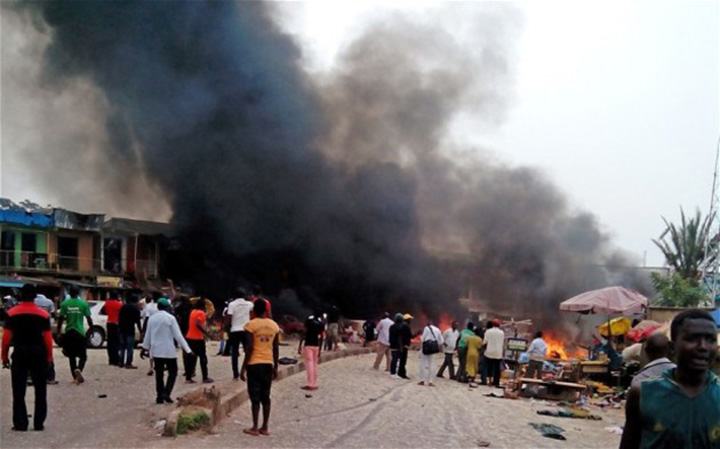
While the world's eyes rivet to France, where 17 people died following the terrorist attacks on satirical magazine Charlie Hebdo, Islamic group Boko Haram continues to wage a seemingly unstoppable war in Nigeria, killing over 2,000 civillians in the span of just a few days.
On Saturday, a girl, no older than 10 years, detonated powerful explosives concealed under the veil of her hijab at a Nigeria market, killing at least 20 people and wounding many more.
The explosion, which was witnessed by dozens of people, happened at the main entrance of the ever-crowded Monday Market, the largest in the city of Maiduguri. Although no one has claimed responsibility, experts say there is little doubt that Islamic extremist group Boko Haram is behind the deadly attacks.
Bakura Bashir, a shopper who witnessed the explosion, said: "This girl may not necessarily know she was conveying a timed bomb. The girl was torn into two halves, and half of her body was thrown across buildings by the devastating blast."
A security official who took part in the rescue operation said: "The second bomber was terrified by the explosion and she tried to dash across the road but she also exploded."
A police official in the capital, Abuja, said the terrorist group appears to have embarked on a horrifying path of using children as suicide bombers, a tactic unprecedented in the insurgency.
"It's something quite new, and it's disturbing, using these young, young girls wearing hijabs [as suicide bombers], the official told the New York Times. "Now, one has to be suspicious of any lady wearing a hijab - whether it's a young lady, or an old lady."

Just a few hours earlier, the terrorist group had carried out a devastating attack in Baga, a fishing village north of Maiduguri, leaving an estimated 2000 people dead. Amnesty International described as the terror group's "deadliest massacre" to date, and local defense groups said they had given up counting the bodies left lying on the streets.
Musa Alhaji Bukar, a senior official in Borno, told the BBC that a fleeing resident reported to him that Baga, which had a population of about 10,000, was now "virtually non-existent" and "burnt down" as a result of the attack.
Yahaya Takakumi, a 55-year-old farmer, told the Premium Times that he escaped from Baga with one of his wives and spent four days traveling to safety through the bush. However, he cannot find four of his children, his second wife and his elder brother, a blacksmith in Baga.
"We saw dead bodies especially, on the islands of Lake Chad where fishermen had settled," the newspaper quoted Takakumi, as saying. "Several persons were killed there like insects."
Since 2009, Boko Haram has terrorized northern Nigeria in an attempt to establish a caliphate, or state ruled by Islamic law, throughout the region. The group has violently attacked police, schools, churches and civilians and bombed government buildings, resulting in over 9,000 dead. In 2014 alone, over 2,000 people have been killed, while more than 1.5 million people have been displaced from their homes.
However, Saturday's suicide bombing and village massacre have gained surprisingly little media coverage, while the Charlie Hebdo tragedy in Paris has dominated headlines since Wednesday.
On Twitter, Max Abrahms, a terrorism analyst, tweeted: "It's shameful how the 2K people killed in Boko Haram's biggest massacre gets almost no media coverage."
Musician Nitin Sawhney said: "Very moving watching events in Paris - wish the world media felt equally outraged by this recent news too."
According to The Atlantic's Matt Schiavenza, Boko Haram's ability to attack with little pushback--and little media coverage--is due to Nigeria's "corrupt and ineffective" government which has historically refused to acknowledge terror within the country. He references, in particular, Nigerian president Goodluck Jonathan, who has done little to contain the terrorist group since emerging as the country's leader in 2010.
"During his campaign for re-election-Nigerians go to the polls on February 14-Jonathan has vowed to tackle his country's problem with graft. At a campaign rally on Thursday, the president exhorted his followers to support him," Schiavenza writes. "'You must vote for your liberation, you must vote for your development, you must vote to take Nigeria to the moon,'" he said. 'You cannot vote to take Nigeria backward.' Boko Haram wasn't mentioned once."
However, Ignatius Kaigama, the Catholic Archbishop of Jos in central Nigeria - an area which has also suffered terror attacks - placed partial blame on the West, asserting that Nigeria cannot confront Boko Haram on its own.
"[the recent attacks are] monumental tragedy. [They have] saddened all of Nigeria. But... we seem to be helpless," he told the BBC. "Because if we could stop Boko Haram, we would have done it right away. But they continue to attack, and kill and capture territories... with such impunity."
Since then, Nigerian spokesperson Chris Olukolade has called on the international community to help support their military in defeating the terrorist group.
"The attack on the town by the bloodhounds and their activities since January 3rd, 2015 should convince well-meaning people all over the world that Boko Haram is the evil all must collaborate to end, rather than vilifying those working to check them," he said.
According to an annual survey conducted by Open Doors, a U.S. based persecution watchdog, Nigeria topped the list of most Christians confirmed to have been killed for their faith in 2014, with a staggering 2,484.
















